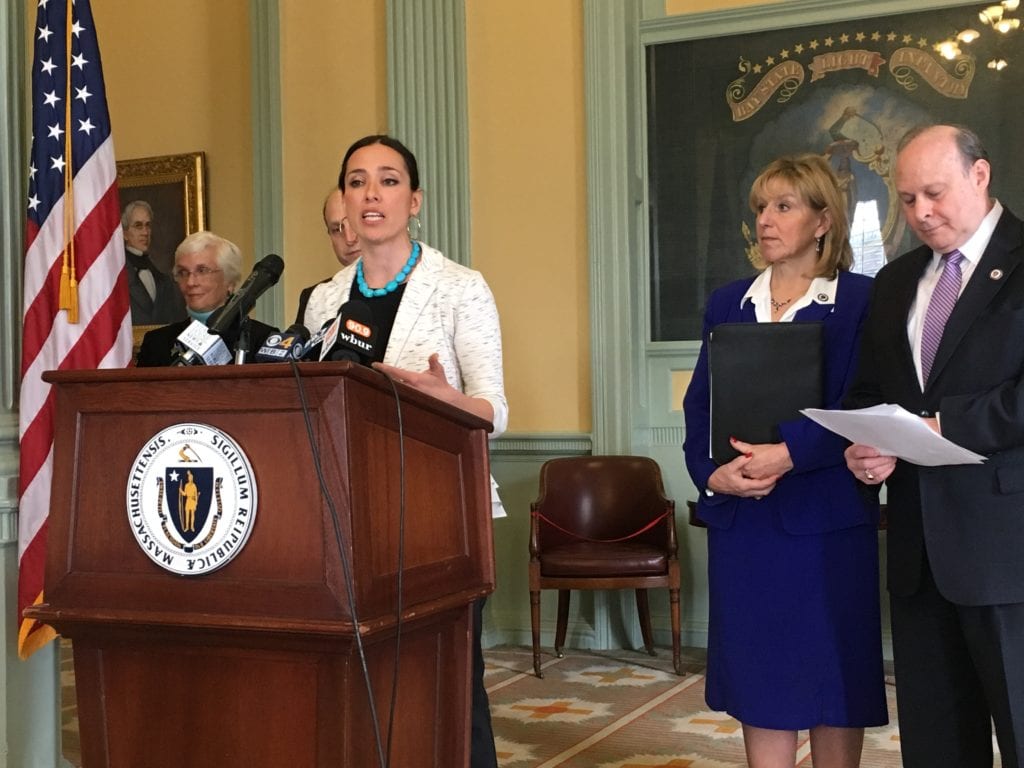
Yawu Miller
A group of state senators today rolled out compromise legislation that would over the next ten years raise the cap on the percentage of charter schools operating in low-performing school districts from the current 18 percent to 23 percent.
The announcement comes as a campaign led by the New York-based Families for Excellent Schools is preparing to spend $18 million on a ballot referendum that would allow up to 12 new charter schools a year — lifting the current cap on that limits charter schools to 18 percent of school spending in the state’s low-performing districts.
“For us to allow this to go to the ballot, which would expose the citizens of the commonwealth to $300 million a year in costs, is reckless,” said Barnstable Senator Dan Wolf, speaking during a State House press conference announcing the legislation.
The legislation calls on the state to increase funding for charter and district-run schools with an increase of $1.4 billion to the state’s foundation budget for education over the next seven years while lifting the cap by half a percent a year over the next ten years.
Additionally, the legislation would create a unified enrollment system, allowing parents to sign up for district and charter schools in the same process, while allowing parents who do not want their children to attend charter schools to opt out.
State Sen. Sonia Chang-Diaz told reporters she represents parents with children in both charter and district schools and sought to craft legislation that would benefit both.
“I’m very pleased to say that this legislation meets that standard,” she said.
Charter proponents rejected the Senate proposal.
“This is not a reform bill,” said Marc Kenen, executive director of the Massachusetts Charter School Association in a statement sent to the media. “It is designed to freeze the growth of public charter schools across the state, and it imposes onerous new regulations that will shackle the operation of existing charter schools.”
Among the regulations Kenen referenced are the following measures:
• Requirements for charters to provide greater transparency and make public information on their finances, the minutes of their board meetings and to disclose information on their contracts.
• A measure requiring charters to fill vacant seats when students leave mid-year.
• A requirement that charter school teachers undergo certification.
• A requirement that charter school teachers who opt to form collective bargaining units be afforded wages and benefits commensurate with those available to teachers in the districts in which the charters operate.
Additionally, schools that suspend high numbers of students or maintain higher-than-average attrition rates would have their charters revoked.
The measures appear designed to bring a higher degree of accountability to the state’s charter schools, which critics say push out English Language Learners, low-performing students and learning disabled students through suspension rates that are often many times higher than those in district schools.
Senators at today’s press conference said they sought to level the playing field between charter and district-run schools.
“The Senate took this bill as an opportunity to address funding and fairness for all of our students,” said Ashland Senator Karen Spilka. “We are in a unique moment. We can take all we have learned over 20 years of education reform and adequately, fairly and fully fund our education system.”
Senate President Stanley Rosenberg said the Senate would likely debate and vote on the legislation next week.







